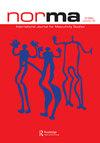The presidential kiss: Duterte’s gendered populism, hypermasculinity, and Filipino migrants
IF 2.1
Q2 SOCIOLOGY
引用次数: 2
Abstract
ABSTRACT In this article, I combine literature on gender populism and international migration to critically examine Duterte’s populist style towards migrant Filipinos and propose several possible reasons why they have given him immense support. The article utilizes Feminist Critical Discourse Analysis (FCDA) to examine texts surrounding Duterte’s much-publicized kiss of a migrant Filipino woman illustrating how his brand of populism reconfigures the state’s paternalistic- hypermasculine stance towards Filipino women migrants. He does this by positioning himself as a ‘protective and angry father,’ ‘the Filipino everyman,’ and ‘a ladies’ man,’ thereby normalizing and trivializing the controversial act. I interpret these gendered tropes as characteristic of Duterte’s personalistic rhetoric and practices, adding a layer to the usual techno-bureaucratic state language strategically used to govern migrant Filipinos. In doing so, I aim to expand understandings of Duterte’s leadership and populist politics and to add to research grounding gender populism within the context of a non-European migrant-sending state. In unraveling his rhetorical style, I hope that resistant discourses emerge to challenge similar practices in the future.总统之吻:杜特尔特的性别民粹主义、超级男子气概和菲律宾移民
摘要在本文中,我结合性别民粹主义和国际移民文献,批判性地审视了杜特尔特对菲律宾人移民的民粹主义风格,并提出了他们给予他巨大支持的几个可能原因。这篇文章利用女权主义批判话语分析(FCDA)来研究围绕杜特尔特对一名菲律宾移民女性的亲吻而广为人知的文本,说明他的民粹主义品牌如何重新塑造国家对菲律宾女性移民的家长式-超男性化立场。他将自己定位为“保护和愤怒的父亲”、“菲律宾普通人”和“女人”,从而使这一有争议的行为正常化和琐碎化。我将这些带有性别色彩的比喻解读为杜特尔特个性化言论和实践的特征,为通常用于管理菲律宾人的技术官僚国家语言增添了一层色彩。通过这样做,我的目的是扩大对杜特尔特领导层和民粹主义政治的理解,并在非欧洲移民派遣国的背景下增加基于性别民粹主义的研究。在揭示他的修辞风格的过程中,我希望未来会出现抵制话语来挑战类似的做法。
本文章由计算机程序翻译,如有差异,请以英文原文为准。
求助全文
约1分钟内获得全文
求助全文
来源期刊

NORMA
Social Sciences-Gender Studies
CiteScore
3.00
自引率
14.30%
发文量
23
期刊介绍:
NORMA is an international journal for high quality research concerning masculinity in its many forms. This is an interdisciplinary journal concerning questions about the body, about social and textual practices, and about men and masculinities in social structures. We aim to advance theory and methods in this field. We hope to present new themes for critical studies of men and masculinities, and develop new approaches to ''intersections'' with race, sexuality, class and coloniality. We are eager to have conversations about the role of men and boys, and the place of masculinities, in achieving gender equality and social equality. The journal was begun in the Nordic region; we now strongly invite scholarly work from all parts of the world, as well as research about transnational relations and spaces. All submitted manuscripts are subject to initial appraisal by the Editors, and, if found suitable for further consideration, to peer review by independent, anonymous expert referees. All peer review is double blind and submission is online via Editorial Manager.
 求助内容:
求助内容: 应助结果提醒方式:
应助结果提醒方式:


